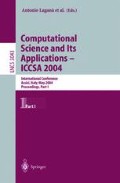Abstract
We first introduce three ideas related with human mind: Brooks implies that in spite of recent success in Alife and behave-based AI, a fundamental problem in modeling biology is consciousness. Minsky states that negative knowledge appears in seemingly positive knowledge through suppression, and emotions are double negative. Cohen suggests that origin of knowledge relies on schema, and a behavior-based agent can learn a physical schema directly from environment. We propose that certain emotion and knowledge seem to exist together and thus there might be a developmental path from emotion to knowledge during evolution. Next, we propose that negation is a logical schema, which allows an agent to perceive a physical schema itself. Finally, we show that negation and emotion both using suppression and negation can be bases for generating emotions. Negation seems the first distinction for knowledge and might be near the locus of consciousness.
Access this chapter
Tax calculation will be finalised at checkout
Purchases are for personal use only
Preview
Unable to display preview. Download preview PDF.
References
Brooks, R.: The Relationship between matter and life, Nature. Macmillan Magazines 409 (2001)
Cohen, P.R., Atkin, M.S., Oates, T.: Learning Conceptual Knowledge by Sensorimotor Interaction with an Environment. In: Proceedings of the 6th International Conference on Intelligent Autonomous System (2000)
Mandler, J.M.: How to build a baby: Conceptual primitives. Psychological Review 99(4) (1992)
Minsky, M.: Negative Expertise. International Journal of Expert Systems 7(1) (1994)
Picard, J.: Affective Computing. MIT Press, Cambridge (1997)
Quinlan, J.R.: C4.5: Programs for Machine Learning. Morgan Kaufmann, San Francisco (1993)
Russell, S., Norvig, P.: Artificial Intelligence: A Modern Approach. Prentice-Hall International, Englewood Cliffs (1995)
Shavlik, J.W., Dietterich, T.G.: Readings in Machine Learning. Morgan KaufMann Publishers, San Francisco (1990)
Sowa, John, F.: Conceptual Structures: Information Processing in Mind and Machine. Addison-Wesley Publishing Co. Reading (1983)
Tae, K.S.: Semantic Aspects of Negation as Schema. Journal of Korea Information Processing Society 9-B (1) (2002)
Author information
Authors and Affiliations
Editor information
Editors and Affiliations
Rights and permissions
Copyright information
© 2004 Springer-Verlag Berlin Heidelberg
About this paper
Cite this paper
Tae, K.S., Youn, H.Y., Park, GL. (2004). On Negation-Based Conscious Agent. In: Laganá, A., Gavrilova, M.L., Kumar, V., Mun, Y., Tan, C.J.K., Gervasi, O. (eds) Computational Science and Its Applications – ICCSA 2004. ICCSA 2004. Lecture Notes in Computer Science, vol 3043. Springer, Berlin, Heidelberg. https://doi.org/10.1007/978-3-540-24707-4_15
Download citation
DOI: https://doi.org/10.1007/978-3-540-24707-4_15
Publisher Name: Springer, Berlin, Heidelberg
Print ISBN: 978-3-540-22054-1
Online ISBN: 978-3-540-24707-4
eBook Packages: Springer Book Archive

